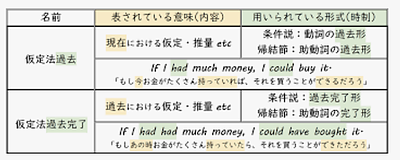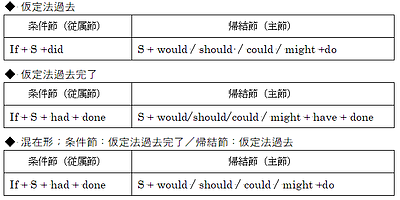
英検1級取得者によるオンライン個別指導のプロ
英語パーソナルジム HIET(ヒート)/ High Intensity English Training
- お電話での
お問い合わせ - 090-3825-5237
コラム
英文法5分ドリル【仮定法①】
2023年11月12日 公開 / 2023年12月2日更新
Would you have taken the job if you ( ) how terrible the conditions were?
① knew
② had known
③ have known
④ were known
〈仮定法過去完了〉 の基本形。
how (形)/(副) S V「どれほど…か」〔程度〕
terrible「ひどい」
仮定法の「法」=「話者の判断」
✰ 直 接 法 = ある事柄が事実である
✰ 仮 定 法 = ある事柄が事実と矛盾する
正解:②
「もしどのくらいひどい条件か知っていたとしたら,その仕事に就きましたか」
Would you have taken the job if you had know how terrible the conditions were?
Alternative 1:
If you had been aware of how dreadful the conditions were, would you still have accepted the job?
Alternative 2:
Had you known about the terrible conditions, would you have chosen to take the job?
“Was Jack at the party?”
“I don’t think so. If he had been, I ( ) him.”
① had seen
② saw
③ would have seen
④ would see
〈仮定法過去完了〉の基本形を用いる問題。
仮定法には「基本形」と呼ばれるものがある。
まずはその動詞の形を公式として覚えることが重要。
正解:③
「ジャックはパーティーに参加していましたか」
「いなかったと思います。もしいたならば彼を見たでしょう」
“Was Jack at the party?”
“I don’t think so. If he had been, I would have seen him.”
Alternative 1:
"Did Jack attend the party?" "I doubt it. If he had, I believe I would have noticed him."
Alternative 2:
"Was Jack present at the party?" "I'm inclined to think not. If he had been there, I'm pretty sure I would have spotted him."
If silver ( ) scarcer than gold, it will no doubt have a greater value.
① became
② will become
③ becomes
④ had become
仮定法でないことを主節の will から判断できるかを問う問題。
ifがまとめる節の内容は未来の内容だが,
条件の副詞節であるために現在時制を用いる。
a greater valueの後ろはthan goldを補って考える。
scarce「まれ」
“仮定法”とは動詞の形の話で if との本質的繋がりはない
正解:③
「もし銀が金より希少になれば間違いなくより価値がでるだろう」
If silver becomes scarcer than gold, it will no doubt have a greater value.
Alternative 1:
Should silver become rarer than gold, its value is likely to increase.
Alternative 2:
Were silver to become scarcer than gold, undoubtedly its value would rise.
If I ( ) home a little earlier, I would not have been caught in a shower.
① left
② have left
③ leave
④ had left
過去の事実と反対の内容を〈仮定法過去完了〉で表現する。
〈人〉is caught in a shower「〈人〉がにわか雨,夕立に会う」
正解:④
「もう少し早く家を出ていたら,雨に会わなかっただろう」
If I had left home a little earlier, I would not have been caught in a shower.
Alternative 1:
Had I left home a bit earlier, I could have avoided getting caught in the rain.
Alternative 2:
If only I had left home a tad earlier, I wouldn't have been caught in that shower.
If I ( ) a little harder in my high school days, I’d be a college student now.
① studied
② have studied
③ had studied
④ have been studying
in my high school days と now に注目。
<if節:仮定法過去完了/帰結節:仮定法過去>
I’d beから仮定法過去の基本形と判断して
① studied を選ばないことができるかが焦点。
このような
【仮定法過去完了&仮定法過去の混在形】
は基本的に『後悔の念』を表す。
これは人間の思考様式から見ても本質的であるし,
入試問題としても頻度が高い。そこで,
仮定法の問題を解く際には常に時の副詞に注意する
正解:③
「高校時代にもう少しがんばっていたら,今頃大学生だろうに」
If I had studied a little harder in my high school days, I’d be a college student now.
Alternative 1:
If I had put in more effort during high school, I would be a college student today.
Alternative 2:
Had I been more diligent in my high school studies, I might be a college student now.
I’d stay at home if I ( ) you.
① had been
② am
③ were
④ would be
現在の事実に対する仮定を仮定法過去で表現する。
仮定法ではif節中の be 動詞は人称に関係なく were を
用いることが多い。
過去形は現実との心理的距離を表す。
If I were you は相手の立場に立ってからの助言を表すが,
これは日本語表現の
「私だったら」〈非現実〉と近い感覚。
仮定法とは話者の意識の中で常に直説法(事実)と対象される話者の“反実仮想”の気持ち(=法)の表現である
正解:③
「私がきみの立場なら家に留まるだろうに」
I’d stay at home if I were you.
Alternative 1:
If I were in your shoes, I would choose to stay at home.
Alternative 2:
Were I you, I'd opt to remain at home.
If you ( ) your car here, you would have got fined.
① parked
② had parked
③ were parking
④ park
過去の事実に対する仮定を〈仮定法過去完了〉で表現する。
get fined「罰金を科される」
正解:②
「もしここに駐車していたとしたら,罰金を科されていただろう」
If you had parked your car here, you would have got fined.
Alternative 1:
Had you parked your car in this spot, you would have incurred a fine.
Alternative 2:
If your car had been parked here, you'd be facing a fine.
If you had not told me the way to solve the problem, I (
) what I am now.
① would not have been
② would not be
③ would have not been
④ had not been
now に注目。
<if 節:仮定法過去完了/ 帰結節:仮定法過去>
what I am「現在の自分(の状態)」
If 節の had not told につられて
〈仮定法過去完了〉の基本形と判断してはいけない。
正解:②
「もしきみがあの問題解決法を教えてくれなかったとしたなら,今の僕はないよ」
If you had not told me the way to solve the problem, I would not be what I am now.
Alternative 1:
Were it not for your guidance on solving the problem, I wouldn't be where I am today.
Alternative 2:
If you hadn't shared the solution to the problem with me, my current situation would be different.
If America hadn’t reached the moon in 1969, the Soviet Union ( ) the first.
① might be
② might have been
③ might was
④ might having been
過去の事実に対する仮定を〈仮定法過去完了〉を用いて表現する.
正解:②
「アメリカが1969年に月に行ってなかったら,ソビエトが最初だっただろう」
If America hadn’t reached the moon in 1969, the Soviet Union might have been the first.
Alternative 1:
Had the United States not landed on the moon in 1969, the Soviet Union could have been the first to achieve it.
Alternative 2:
If America hadn't accomplished the moon landing in 1969, the Soviet Union might have taken the lead.
If you were really interested in what I’m saying, you ( ) staring out of the window.
① will be
② will have been
③ would have been
④ wouldn’t be
現在の事実に対する仮定を仮定法過去形で表現する。
be interested in A 「Aに興味を持つ」
Aに相当するのが what I saying「私の言っていること」
stare「見つめる」
正解:④
「もし君が私の話に本当に興味があるなら,窓の外を見ていたりしないだろう」
If you were really interested in what I’m saying, you wouldn’t be staring out of the window.
Alternative 1:
Were you genuinely interested in what I'm saying, you wouldn't be gazing out of the window.
Alternative 2:
If your interest in my words were sincere, you wouldn't be staring out the window.
( ) he to see you, he’d be surprised.
① Be
② Was
③ Were
④ Has been
if he were to see youの if 省略による倒置。
仮定法のifは省略可。
その場合必ずV+Sの倒置が生じる(文語)
✰ if S were ➪ were S …
✰ if S had done ➪ had S done
✰ if S should do ➪ should S V
正解:③
「君に会えば,彼はびっくりするだろうに」
Were he to see you, he’d be surprised.
Alternative 1:
If he were to catch sight of you, he would be taken aback.
Alternative 2:
Should he see you, his reaction would likely be one of surprise.
If I ( ) breakfast this morning, I would not be hungry now.
① eat
② ate
③ had eaten
④ would have eaten
時を表す副詞 this morning と now がそれぞれの節で
(過去)と(現在)の話題であることを示している。
<if節:仮定法過去完了 / 帰結節:仮定法過去>
I would not be につられて<仮定法過去>の基本形と
判断し ate を選択しないようにすべき問題。
正解:③
「もし今朝朝食を食べていたなら,今頃お腹がへってはいないだろうに」
If I had eaten breakfast this morning, I would not be hungry now.
Alternative 1:
Had I had breakfast this morning, I wouldn't be hungry at the moment.
Alternative 2:
If I had eaten something earlier today, I wouldn't be feeling hungry now.
【音読基本英文】
「もしどのくらいひどい条件か知っていたとしたら,その仕事に就きましたか」
Would you have taken the job if you had know how terrible the conditions were?
Alternative 1:
If you had been aware of how dreadful the conditions were, would you still have accepted the job?
Alternative 2:
Had you known about the terrible conditions, would you have chosen to take the job?
「ジャックはパーティーに参加していましたか」
「いなかったと思います。もしいたならば彼を見たでしょう」
“Was Jack at the party?”
“I don’t think so. If he had been, I would have seen him.”
Alternative 1:
"Did Jack attend the party?" "I doubt it. If he had, I believe I would have noticed him."
Alternative 2:
"Was Jack present at the party?" "I'm inclined to think not. If he had been there, I'm pretty sure I would have spotted him."
「もし銀が金より希少になれば間違いなくより価値がでるだろう」
If silver becomes scarcer than gold, it will no doubt have a greater value.
Alternative 1:
Should silver become rarer than gold, its value is likely to increase.
Alternative 2:
Were silver to become scarcer than gold, undoubtedly its value would rise.
「もう少し早く家を出ていたら,雨に会わなかっただろう」
If I had left home a little earlier, I would not have been caught in a shower.
Alternative 1:
Had I left home a bit earlier, I could have avoided getting caught in the rain.
Alternative 2:
If only I had left home a tad earlier, I wouldn't have been caught in that shower.
「高校時代にもう少しがんばっていたら,今頃大学生だろうに」
If I had studied a little harder in my high school days, I’d be a college student now.
Alternative 1:
If I had put in more effort during high school, I would be a college student today.
Alternative 2:
Had I been more diligent in my high school studies, I might be a college student now.
「私がきみの立場なら家に留まるだろうに」
I’d stay at home if I were you.
Alternative 1:
If I were in your shoes, I would choose to stay at home.
Alternative 2:
Were I you, I'd opt to remain at home.
「もしここに駐車していたとしたら,罰金を科されていただろう」
If you had parked your car here, you would have got fined.
Alternative 1:
Had you parked your car in this spot, you would have incurred a fine.
Alternative 2:
If your car had been parked here, you'd be facing a fine.
「もしきみがあの問題解決法を教えてくれなかったとしたなら,今の僕はないよ」
If you had not told me the way to solve the problem, I would not be what I am now.
Alternative 1:
Were it not for your guidance on solving the problem, I wouldn't be where I am today.
Alternative 2:
If you hadn't shared the solution to the problem with me, my current situation would be different.
「アメリカが1969年に月に行ってなかったら,ソビエトが最初だっただろう」
If America hadn’t reached the moon in 1969, the Soviet Union might have been the first.
Alternative 1:
Had the United States not landed on the moon in 1969, the Soviet Union could have been the first to achieve it.
Alternative 2:
If America hadn't accomplished the moon landing in 1969, the Soviet Union might have taken the lead.
「もし君が私の話に本当に興味があるなら,窓の外を見ていたりしないだろう」
If you were really interested in what I’m saying, you wouldn’t be staring out of the window.
Alternative 1:
Were you genuinely interested in what I'm saying, you wouldn't be gazing out of the window.
Alternative 2:
If your interest in my words were sincere, you wouldn't be staring out the window.
「君に会えば,彼はびっくりするだろうに」
Were he to see you, he’d be surprised.
Alternative 1:
If he were to catch sight of you, he would be taken aback.
Alternative 2:
Should he see you, his reaction would likely be one of surprise.
「もし今朝朝食を食べていたなら,今頃お腹がへってはいないだろうに」
If I had eaten breakfast this morning, I would not be hungry now.
Alternative 1:
Had I had breakfast this morning, I wouldn't be hungry at the moment.
Alternative 2:
If I had eaten something earlier today, I wouldn't be feeling hungry now.
今後も英語に関する情報を発信していきます。
関連するコラム
- 英作文《 地獄の果てまで瞬発トレーニング 》② 2024-02-13
- 発表!!【 超重要アウトプット英単語 】 2024-06-16
- 英文法5分ドリル《 ゴールデン動詞フレーズ 》⑩ 2024-06-26
- 【 日本人英語 】の弱点 & 克服方法:〈基本動詞〉の使用が難しい理由 2024-06-01
- 【 日本人英語 】の弱点 & 克服方法:〈基本動詞〉の使用が難しい理由 2024-05-31
コラムのテーマ一覧
カテゴリから記事を探す
TEX 二井原プロへの
お問い合わせ
マイベストプロを見た
と言うとスムーズです
勧誘を目的とした営業行為の上記電話番号によるお問合せはお断りしております。








